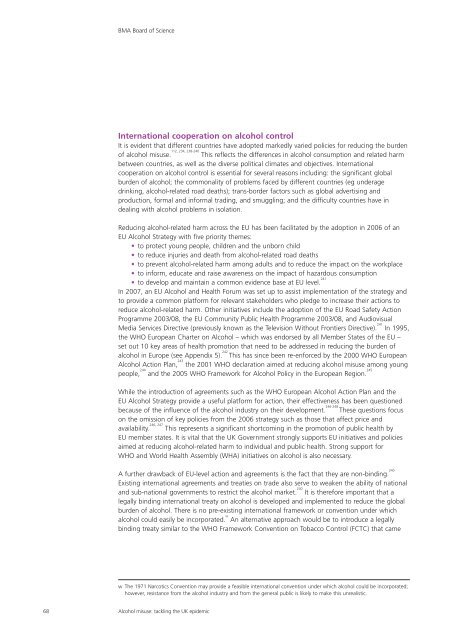Alcohol misuse: tackling the UK epidemic - London
Alcohol misuse: tackling the UK epidemic - London
Alcohol misuse: tackling the UK epidemic - London
Create successful ePaper yourself
Turn your PDF publications into a flip-book with our unique Google optimized e-Paper software.
68<br />
BMA Board of Science<br />
International cooperation on alcohol control<br />
It is evident that different countries have adopted markedly varied policies for reducing <strong>the</strong> burden<br />
112, 234, 238-240<br />
of alcohol <strong>misuse</strong>. This reflects <strong>the</strong> differences in alcohol consumption and related harm<br />
between countries, as well as <strong>the</strong> diverse political climates and objectives. International<br />
cooperation on alcohol control is essential for several reasons including: <strong>the</strong> significant global<br />
burden of alcohol; <strong>the</strong> commonality of problems faced by different countries (eg underage<br />
drinking, alcohol-related road deaths); trans-border factors such as global advertising and<br />
production, formal and informal trading, and smuggling; and <strong>the</strong> difficulty countries have in<br />
dealing with alcohol problems in isolation.<br />
Reducing alcohol-related harm across <strong>the</strong> EU has been facilitated by <strong>the</strong> adoption in 2006 of an<br />
EU <strong>Alcohol</strong> Strategy with five priority <strong>the</strong>mes:<br />
to protect young people, children and <strong>the</strong> unborn child<br />
to reduce injuries and death from alcohol-related road deaths<br />
to prevent alcohol-related harm among adults and to reduce <strong>the</strong> impact on <strong>the</strong> workplace<br />
to inform, educate and raise awareness on <strong>the</strong> impact of hazardous consumption<br />
to develop and maintain a common evidence base at EU level. 241<br />
In 2007, an EU <strong>Alcohol</strong> and Health Forum was set up to assist implementation of <strong>the</strong> strategy and<br />
to provide a common platform for relevant stakeholders who pledge to increase <strong>the</strong>ir actions to<br />
reduce alcohol-related harm. O<strong>the</strong>r initiatives include <strong>the</strong> adoption of <strong>the</strong> EU Road Safety Action<br />
Programme 2003/08, <strong>the</strong> EU Community Public Health Programme 2003/08, and Audiovisual<br />
Media Services Directive (previously known as <strong>the</strong> Television Without Frontiers Directive). 241<br />
In 1995,<br />
<strong>the</strong> WHO European Charter on <strong>Alcohol</strong> – which was endorsed by all Member States of <strong>the</strong> EU –<br />
set out 10 key areas of health promotion that need to be addressed in reducing <strong>the</strong> burden of<br />
alcohol in Europe (see Appendix 5). 242<br />
This has since been re-enforced by <strong>the</strong> 2000 WHO European<br />
<strong>Alcohol</strong> Action Plan, 243<br />
<strong>the</strong> 2001 WHO declaration aimed at reducing alcohol <strong>misuse</strong> among young<br />
people, 244<br />
and <strong>the</strong> 2005 WHO Framework for <strong>Alcohol</strong> Policy in <strong>the</strong> European Region. 245<br />
While <strong>the</strong> introduction of agreements such as <strong>the</strong> WHO European <strong>Alcohol</strong> Action Plan and <strong>the</strong><br />
EU <strong>Alcohol</strong> Strategy provide a useful platform for action, <strong>the</strong>ir effectiveness has been questioned<br />
because of <strong>the</strong> influence of <strong>the</strong> alcohol industry on <strong>the</strong>ir development. 246-248<br />
These questions focus<br />
on <strong>the</strong> omission of key policies from <strong>the</strong> 2006 strategy such as those that affect price and<br />
246, 247<br />
availability. This represents a significant shortcoming in <strong>the</strong> promotion of public health by<br />
EU member states. It is vital that <strong>the</strong> <strong>UK</strong> Government strongly supports EU initiatives and policies<br />
aimed at reducing alcohol-related harm to individual and public health. Strong support for<br />
WHO and World Health Assembly (WHA) initiatives on alcohol is also necessary.<br />
A fur<strong>the</strong>r drawback of EU-level action and agreements is <strong>the</strong> fact that <strong>the</strong>y are non-binding. 240<br />
Existing international agreements and treaties on trade also serve to weaken <strong>the</strong> ability of national<br />
and sub-national governments to restrict <strong>the</strong> alcohol market. 240<br />
It is <strong>the</strong>refore important that a<br />
legally binding international treaty on alcohol is developed and implemented to reduce <strong>the</strong> global<br />
burden of alcohol. There is no pre-existing international framework or convention under which<br />
alcohol could easily be incorporated. w<br />
An alternative approach would be to introduce a legally<br />
binding treaty similar to <strong>the</strong> WHO Framework Convention on Tobacco Control (FCTC) that came<br />
w The 1971 Narcotics Convention may provide a feasible international convention under which alcohol could be incorporated;<br />
however, resistance from <strong>the</strong> alcohol industry and from <strong>the</strong> general public is likely to make this unrealistic.<br />
<strong>Alcohol</strong> <strong>misuse</strong>: <strong>tackling</strong> <strong>the</strong> <strong>UK</strong> <strong>epidemic</strong>
















